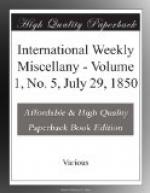There is something in the air of late which has called forth the poets and made them politicians. Formerly they were content to leave these troubled waters undisturbed, but finding that others now are as ignorant as themselves, they have come forth to give at least the benefit of their sentiment to the party they espouse. In no department can phrasemaking prosper where positive ideas have once been attained. Metaphors are powerless in astronomy; epithets are useless as alembics; images, be they never so beautiful, will fail to convince the physiologist. Language may adorn, it cannot create science. But as soon as we pass from the sciences to social science, (or politics,) we find that here the absence of positive ideas gives the phrasemaker the same power of convincing, as in the early days of physical science was possessed by metaphysicians and poets. Here the phrasemaker is king; as the one-eyed is king in the empire of the blind. Phrasemaker for phrasemaker, we prefer the poet to the politician; Victor Hugo to Leon Faucher; Lamartine to Odilon Barrot; Lamennais to Baroche.
Kossuth, Mazzini, Lamartine, the three heroes of 1848, were all, though with enormous differences in their relative values and positions, men belonging to the race of poets—men in whom the heart thought—men who were moved by great impulses and lofty aspirations—men who were “carried away by their imagination”—men who were “dreamers,” but whose dreams were of the stuff of which our life is made.
* * * * *
The fine immortal spirit of inspiration that is ever living in human affairs, is unseen and incredible till its power becomes apparent through the long past; as the invisible but indelible blue of the atmosphere is not seen except we look through extended space.
* * * * *
The distinction between the sensual, frivolous many, and the few spiritual and earnest, may be stated thus—the first vaguely guess the others to be fools, they know that the former are fools.
* * * * *
[FROM THE NEW MONTHLY MAGAZINE.]
FRANK HAMILTON; OR, THE CONFESSIONS OF AN ONLY SON.
BY W.H. MAXWELL, ESQ.
* * * * *
CHAPTER I.
“Malvolio. ’Tis but fortune; all is fortune.”
Twelfth Night.
“Bassanio. ’Tis not unknown to you, Antonio, How much I have disabled my state. By something showing a more swelling port Than my faint means would grant continuance.”
Merchant of Venice.




